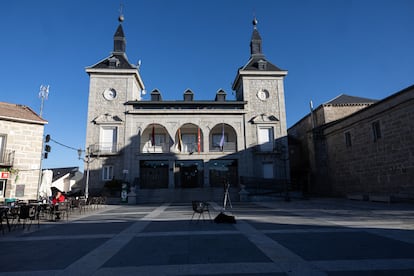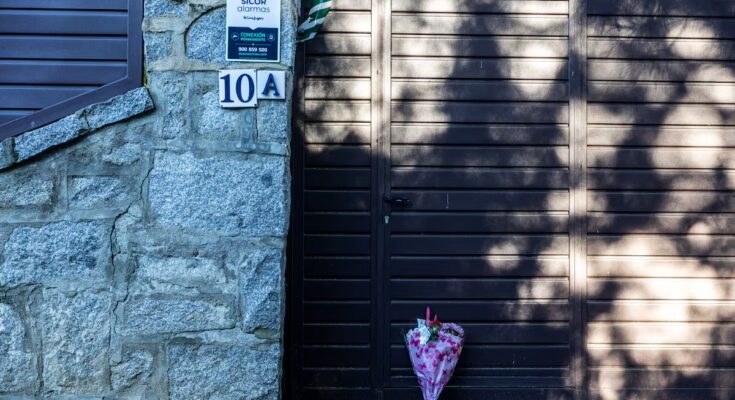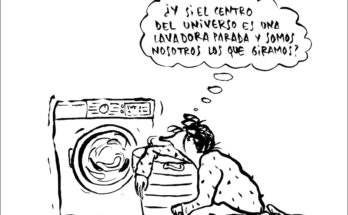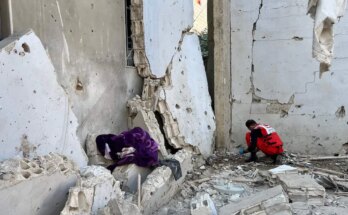An hour from the center of Madrid, in Jara 10 street, in the municipality of Alpedrete, screams were heard at noon last Saturday. They came from a house known as El Indalo. There, Juan Pedro Ródenas, 60, killed his wife, María del Pilar Écija, also 60. He stabbed her 50 times and then took his own life. Three days later, on the doorstep there is a bouquet of flowers and remnants of the green no-entry tape that the Guardia Civil placed at the crime scene. This and a trail of declarations that revolve around an objective fact, foreseen by Spanish legislation and already confirmed by the Ministry of Equality: the murder of María Pilar Écija was a sexist crime and she is already the 38th victim of 2025.
Her body and that of her attacker were found by David Ródenas, 21, the couple’s youngest son, who lived with his parents and was the one who called 112 when he discovered the scene. The autopsy established that the woman had been stabbed and that the man, who had ingested alcohol and drugs, later died.
All sexist murders generate a reaction around them: in family, friends and neighbors, work colleagues or simple acquaintances which is usually not public beyond the minutes of silence or the demonstrations that are called. Outside that smaller circle there is a visible circle, that of those who condemn violence, and another that has been growing for some time, that of those who deny it.
What usually does not happen is that the latter are part of the most direct nucleus of the victims, or at least do not speak publicly, as happened in this case which shook the foundations of the municipality. While a debate developed in which everyone participated, from the mayor of Alpedrete, Juan Fernández, to the Minister for Equality, Ana Redondo, to the President of the Government, Pedro Sánchez, and various political representatives from the left to the far right.
The origin is found in a letter written by the boys on social accounts created specifically to spread the writing. Under the name of Familia Ródenas Écija, they explain that the father asked the system for help without receiving attention, that he was “an exemplary man”. And they assure, without specifying much more for the moment, that this has been ignored, rejected and abandoned. They underline that at dawn on November 15 “everything changed” and that the lack of institutional response is responsible for the crime and the subsequent suicide: “They killed our parents.”
In the letter they say that they have always been a united and happy family, and that now they have been orphaned and silenced. They ask for respect and for their parents to rest in peace. They also thank the mayor of Alpedrete for meeting them and showing their support. And it was precisely the words of city councilor Juan Fernández (PP) that had to do with the controversy.
After expressing his condolences to the family, he stressed that this was a man who “loved his wife very much” and argued that what failed was the system by not detecting the psychological illness from which he believed the attacker suffered. “It wasn’t out of hatred,” insisted the councilor, who also initially underlined that there were no previous reports of mistreatment.
Pedro Sánchez stated in He added that those who downplay these crimes “are not worthy of representing the citizens,” referring directly to the mayor.
After the social pressure generated by his statements, Fernández was forced in the last few hours to rectify, even if he did so without too much conviction, without speaking directly about the sexist violence. Thus, the mayor defended in another video broadcast online his “total and absolute rejection” of any form of violence against women which, he states, must be eradicated as soon as possible. He attributes the controversy and that his words were “misinterpreted” and comments that his only intention was to accompany the people close to him.
At that point, the Minister of Equal Opportunities had already censored his words: “The statements of the mayor of Alpedrete are intolerable. The deniers mask reality to deny the evidence of sexist mistreatment and violence. Denialism kills. I ask for immediate rectification or his resignation. We want each other alive.”
The mayor, with his words, has engaged in the denialist discourse of sexist violence by spreading incorrect ideas. For example, lack of reporting rules out violence. Most victims don’t do this for various reasons. For fear for their lives, for that of their children, of not being believed or of not yet recognizing themselves as victims. Of the 1,333 murders officially registered since 2003, only 296 had a prior report: 22.2%.
Or even the perception that one may have from the relational environments in which this violence exists, when many times it may not be visible to others, or certain normalized behaviors may occur when they are not. Of the 2,551,626 reports of sexist violence that have existed since it was recorded in 2009, only 46,083 were presented by family members, 1.8%; and 70,030 for what was registered as assistance or third party services in general, 2.7%.
One of the institutional objectives in Spain and other countries, and that of international organizations, is to generate a social conscience in which violence is understood and assumed as the structural problem it represents, not only because it affects millions of women – the WHO estimates that approximately one in three worldwide – but because it has consequences for them and for the entire society: emotional, psychological, physical, health and economic.

“The son shouted that he was now alone”
A neighbor explains that she heard her son’s screams: “He was shouting that he shouldn’t have gone out that night and that now he was left alone”, she says, without wanting to give her name for fear of retaliation. The couple moved into the cabin four years ago, according to another tenant. They previously lived in another area of the same city, a town of more than 15,000 inhabitants, located in the mountains of Madrid and which is a residential and affluent place, with an average disposable income of just over 30,000 euros a year, according to the Revenue Agency.
The eldest son, Diego Ródenas, 30, left home when he was 18 and returned a month ago, even though he did not live with them, other neighbors explain. David, the youngest, is best known for playing football after school. “She almost never went out and he was sick,” says Juan, who asks to be included without his surname, from a bar near the town hall, where official mourning was declared this Monday and a minute’s silence was called in memory of the murdered woman.



